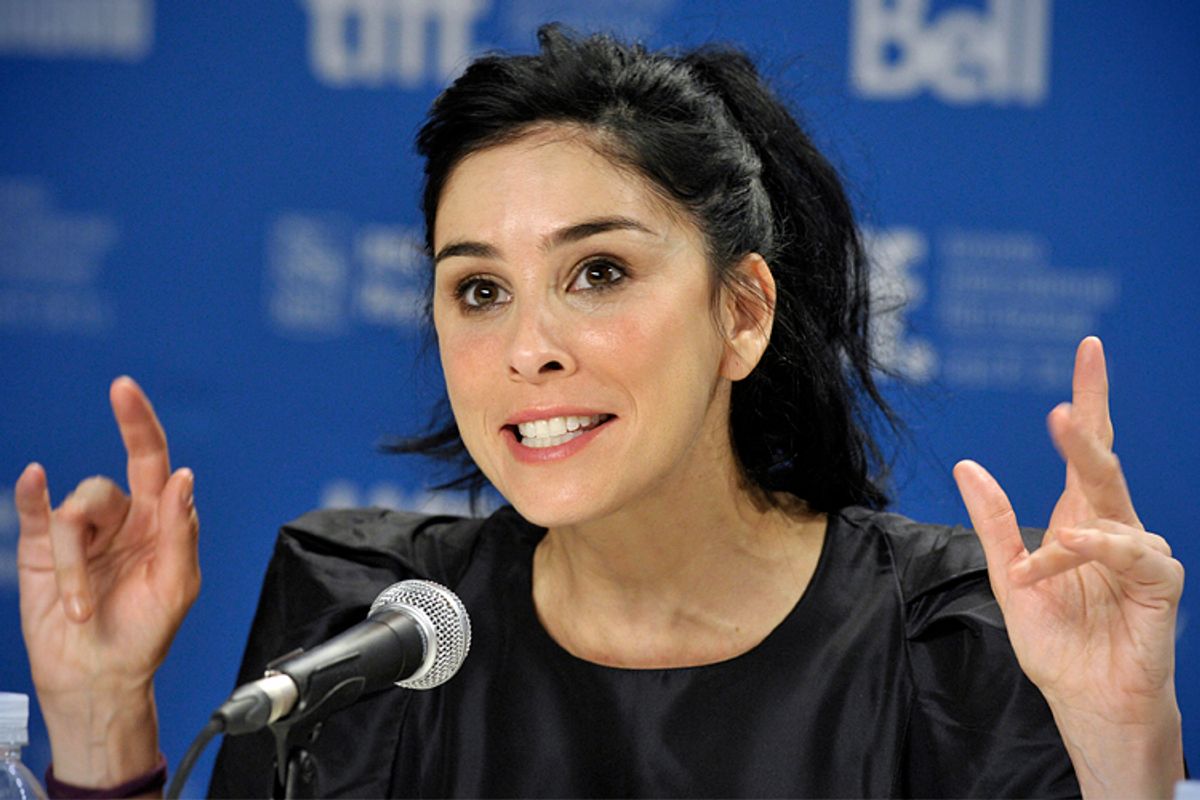You shouldn't have to call a fetus "goo" to make a case for choice, but this past weekend, Sarah Silverman did just that. Appearing on "Real Time With Bill Maher," the comic spoke about her fundraising efforts to help Texas women – who often have to travel extreme distances for the services – obtain affordable, safe abortions. It's a worthwhile cause from a tireless advocate for women's health. And as she explained her desire for antiabortion advocates to "see us as human," Silverman said she wants them to recognize "a human face to this side that they only know as 'people who want to murder babies.' And meanwhile, it's goo. It's goo that they’re so worried about. And they're born, and it’s, 'You’re on your own, slut.'" Naturally, Breitbart and LifeNews quickly went nuts over the remark.
Sometimes I think that I'd love to be able to just think of what occurs inside of a pregnancy as plain old goo. It'd certainly make any conversations I might want to have around abortion a lot more quickly resolved. I can't, though. Yet on the other side, there's loads I disagree with in Michael Brendan Dougherty's Wednesday piece for the Week on how "the presence of biological life should inform our idea of personhood," an essay in which he asserts, "Anti-abortion advocates see themselves as advocates of a reality-based community, and so they show little patience with arguments that we can generate our own private meanings about when life begins." But I'm glad he included a mention of his colleague Ryan Cooper's logic that "an abortion represents the end of life, which I distinguish from the idea of a human being." Last year, I said as much in Salon, writing of my own firmly pro-choice position that life starts at conception, a stance that's still earning me hate mail, only occasionally of the violent fantasy variety. (PS, thanks, life-loving self-proclaimed Christians! I'm sure Jesus would be super-proud!)
In the never-ending ideological battle over abortion, the great burning question perpetually boils down to whether what is growing in a woman's body is a human life or not, and how much if any protection it is entitled to. It's because, as Silverman acknowledged to Maher, we face the stigmatizing notion that if we yield to the idea that a fetus is a life, we're baby killers. But a fetus is not an autonomous human being. And a fetus should not have equal – or maddeningly, infuriatingly -- more rights than the woman in whose body it grows. Here, I'll make list of how health and choices and rights should be prioritized: 2. Fetus. 1. Woman.
When we look at health and reproductive rights in those terms, we're less likely to have nightmare scenarios like the one that happened to Marlise Munoz, the pregnant Texas woman whose family had to fight a legal battle to remove her from life support, because a majority of states have laws "restricting the ability of doctors to end life support for terminally ill pregnant women, regardless of the wishes of the patient or the family." We'll have fewer horror shows like the one that ended in the agonized death of Savita Halappanavar, who was refused a lifesaving abortion in an Irish hospital in 2012. When we give women autonomy over their bodies, when we trust them to know what's best for them, first and foremost, without second-guessing their reasons or questioning their morals, we make a world that's healthier and safer for everybody.
But when we dismiss a fetus as just "goo," we deny the families of women like Munoz and Halappanavar the experience of grieving not just for the women lost but the babies they believed those women were going to give birth to. We diminish the thoughtful, difficult choices of families like the ones portrayed in the incredible documentary "After Tiller," and the doctors who acknowledge, "I’ve struggled because I think of them as babies." And If you think a fetus is just goo, then explain to me the emotional pain and suffering of so many families I know who've endured miscarriages. Explain it to them that they're crying over goo.
During my pregnancies I believed I was carrying life inside of me, and I'm grateful that I live in a place where the decision of what to do with that life, given my circumstances at the time, was mine to make. When we prioritize the idea of a baby over the reality of a woman, women suffer, and women die. And reproductive choice doesn't need any other reason than that.



Shares